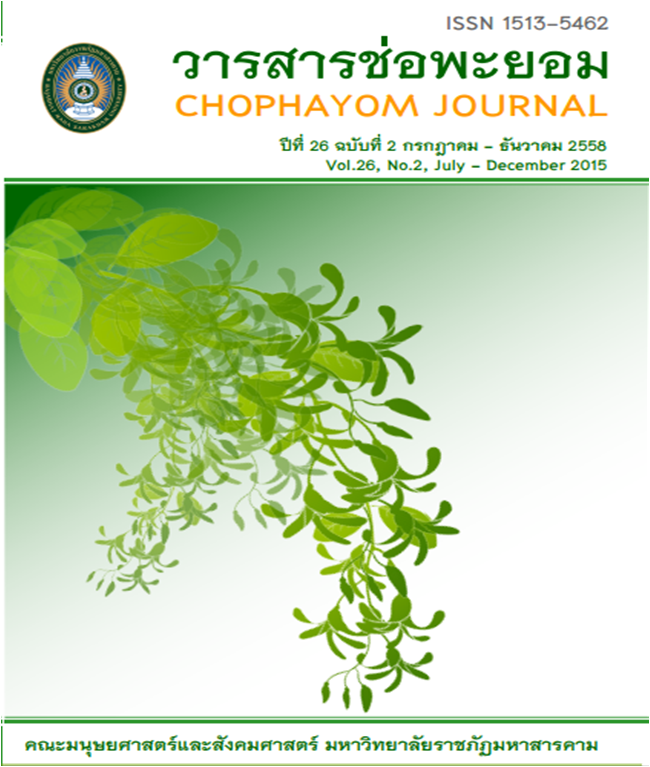การเปรียบเทียบความสามารถในการโต้แย้งและการคิดวิเคราะห์จากการเรียนประเด็นปัญหาสังคมที่เกี่ยวข้องกับการใช้วิทยาศาสตร์โดยใช้การเรียนแบบผสมผสานตามวิธีปัญหาเป็นฐาน กับวิธีวัฏจักรการเรียนรู้ 5 ขั้น ของนักเรียน ชั้นมัธยมศึกษาปีที่ 5 ที่มีความเข้าใจธรรมชาติวิทย
Abstract
บทคัดย่อ
การวิจัยครั้งนี้มีความมุ่งหมายเพื่อเปรียบเทียบความสามารถในการโต้แย้งและการคิดวิเคราะห์จากการเรียนประเด็นปัญหาทางสังคมที่เกี่ยวข้องกับการใช้วิทยาศาสตร์ โดยใช้การเรียนแบบผสมผสานตามวิธีปัญหาเป็นฐานกับวิธีวัฏจักรการเรียนรู้ 5 ขั้น ของนักเรียนชั้นมัธยมศึกษาปีที่ 6 ที่มีความเข้าใจธรรมชาติวิทยาศาสตร์ต่างกัน จำนวน 77 คน จาก 2 ห้องเรียน ซึ่งได้มาจากการสุ่มแบบกลุ่ม แล้วแบ่งนักเรียนออกเป็น 2 กลุ่ม ได้แก่ กลุ่มที่ 1 จำนวน 38 คน เรียนแบบผสมผสานตามวิธีปัญหาเป็นฐาน และกลุ่มที่ 2 จำนวน 39 คน เรียนแบบผสมผสานตามวิธีวัฏจักรการเรียนรู้ 5 ขั้น เครื่องมือที่ใช้ในการวิจัยประกอบด้วย 1) แผนการจัดการเรียนรู้ปัญหาทางสังคมที่เกี่ยวข้องกับการใช้วิทยาศาสตร์ 3 ประเด็น ได้แก่ การโคลนนิ่ง การอุ้มบุญ และพืชดัดแปลงพันธุกรรม สำหรับการเรียนแบบผสมผสานวิธีปัญหาเป็นฐานกับวิธีวัฏจักรการเรียนรู้ 5 ขั้น อย่างละ
3 แผน ใช้เวลาเรียนแผนละ 3 ชั่วโมงต่อสัปดาห์ 2) แบบทดสอบวัดความสามารถในการโต้แย้ง แบ่งเป็น 4 ชุดๆละ 4 ข้อ และ 3) แบบทดสอบวัดการคิดวิเคราะห์ จำนวน 30 ข้อ มี 3 ด้าน ได้แก่ การวิเคราะห์ความสำคัญ การวิเคราะห์ความสัมพันธ์ และการวิเคราะห์หลักการ สถิติที่ใช้ในการทดสอบสมมติฐาน ได้แก่ Paired t-test และ F-test (Two-way MANCOVA และ ANCOVA)
ผลการวิจัยพบว่า นักเรียนโดยส่วนรวมและจำแนกตามธรรมชาติวิทยาศาสตร์ หลังเรียนประเด็นปัญหาทางสังคมที่เกี่ยวข้องกับการใช้วิทยาศาสตร์โดยใช้การเรียนแบบผสมผสานตามวิธีปัญหาเป็นฐานกับวิธีวัฏจักรการเรียนรู้ 5 ขั้น มีการพัฒนาความสามารถในการโต้แย้งเพิ่มขึ้นจากการสอบครั้งที่ 1-4 และมีการคิดวิเคราะห์โดยรวมและเป็นรายด้านเพิ่มขึ้นจากก่อนเรียน (p < .05) นักเรียนที่มีความเข้าใจธรรมชาติวิทยาศาสตร์ต่างกันมีความสามารถในการโต้แย้งและการคิดวิเคราะห์โดยรวมและเป็นรายด้านไม่แตกต่างกัน (p > .05) ส่วนนักเรียนที่เรียนแบบผสมผสานตามวิธีปัญหาเป็นฐาน มีเฉพาะความสามารถการคิดวิเคราะห์ด้านหลักการ มากกว่านักเรียนที่เรียนวิธีวัฏจักรการเรียนรู้ 5 ขั้น (p < .025) นอกจากนี้ไม่มีปฏิสัมพันธ์ระหว่างธรรมชาติวิทยาศาสตร์และรูปแบบการเรียนต่อความสามารถในการโต้แย้งและการคิดวิเคราะห์ของนักเรียน (p ≥ .377)
คำสำคัญ : ประเด็นปัญหาทางสังคมที่เกี่ยวข้องกับการใช้วิทยาศาสตร์, การโต้แย้ง, การคิดวิพากษ์วิจารณ์, การเรียนแบบผสมผสาน
ABSTRACT
This research aimed to compare effects of learning socioscientific issues using the mixed methods based on the problem-based learning method and the 5E-learning cycle approach on argumentation and analytical thinking abilities of 77 Mattayomsuksa 5 students with different understandings of the nature of science. They were selected from 2 classes, using the cluster random sampling technique, and were divided into 2 groups: the first group of 38 students learned using the mixed methods based on the problem-based learning method and the second group of 39 students learned using the mixed methods based on the 5E-learning cycle approach. Instruments for the research included: 1) learning plans on 3 socioscientific issues: Cloning, Surrogacy and Genetically Modified Plants for the problem-based learning method and the 5E-learning cycle approach, 3 plans each and each plan for 3 hours of learning in a week; 2) four argumentation tests, 4 items each; and 3) an analytical thinking test with 30 items and 3 subscales, :analysis of elements, analysis of relationships, and analysis of organizational principles. The collected data were analyzed for testing hypotheses by means of the Paired t-test and the F-test (Two-way MANCOVA and ANCOVA).
The research findings found that the student as a whole and as classified according to achievement motivation who learned the socioscientific issues using the mixed methods based on the problem-based learning method and the 5E-learning cycle approach showed developments of argumentation from the 1st -4 th test :and showed analytical thinking abilities in general and in each subscale from before learning (p < .001). The students with different understandings of the nature of science did not differently indicate argumentation and analytical thinking abilities in general and in each subscale after learning socioscientific issues (p > .05). The students who learned the socioscientific issues using the mixed methods based on the problem-based learning method evidenced more only analytical thinking abilities in the subscale of analysis of organizational principles than the counterpart students (p < .025). In addition, there were no statistical interactions of understanding of the nature of science with learning method on argumentation and analytical thinking abilities of the students (p ≥ .377).
Keywords : SocioscientificIssues Using, Argumentation, Critical Thinking, Mixed Methods





